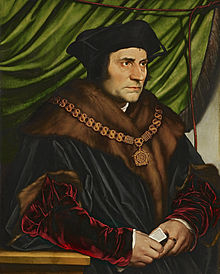What to make of the portrayal of Thomas More in the PBS adaptation of Hillary Mantel’s best-selling novel Wolf Hall? George Wiegel sees it as the latest manifestation of British (or Anglo-American) anti-Catholicism, especially when set against the revisionist transformation of More’s antagonist Thomas Cromwell from amoral fixer into honorable promoter of social harmony.
No doubt, the More of Wolf Hall is a far cry from the More of Robert Bolt’s play and film, “A Man for All Seasons,” which portrays the Lord Chancellor who refused to go along with Henry VIII’s divorce as a modern martyr who valued the individual conscience above everything else, including truth.
Cambridge University historian Eamon Duffy, who’s no anti-Catholic, offers this assessment: “Bolt projected on to his hero opinions More would have indignantly repudiated; Mantel’s starker portrait has sixteenth-century warrant, and far greater plausibility.” That starker portrait stresses More’s well-attested role as a persecutor of Protestants — though he denied torturing them. “More was neither blood-soaked nor a hypocrite, but he was a man of his times, not of ours,” writes Duffy.
The only problem with this view is that there were many men of his times, just as there are many men (and women) of ours. The fact is that the kind of liberty of conscience for which Bolt celebrated More was celebrated by More himself — until it wasn’t. In his most famous work, Utopia, he created a vision of an ideal society that was notable for its establishment of religious liberty:
This law was made by Utopus, not only for preserving the public peace, which he saw suffered much by daily contentions and irreconcilable heats, but because he thought the interest of religion itself required it. He judged it not fit to determine anything rashly; and seemed to doubt whether those different forms of religion might not all come from God, who might inspire man in a different manner, and be pleased with this variety; he therefore thought it indecent and foolish for any man to threaten and terrify another to make him believe what did not appear to him to be true. And supposing that only one religion was really true, and the rest false, he imagined that the native force of truth would at last break forth and shine bright, if supported only by the strength of argument, and attended to with a gentle and unprejudiced mind; while, on the other hand, if such debates were carried on with violence and tumults, as the most wicked are always the most obstinate, so the best and most holy religion might be choked with superstition, as corn is with briars and thorns; he therefore left men wholly to their liberty, that they might be free to believe as they should see cause.
More wrote Utopia in 1516, a year before Martin Luther kicked off the Protestant Reformation by writing his 95 Theses protesting the sale of indulgences. A decade later, with Europe torn apart by sectarian conflict and himself in a position of increasing political power, More behaved altogether differently — in contrast to his friend Erasmus, the greatest humanist of the age, who counseled tolerance and moderation.
More is widely held responsible for the capture and execution of William Tyndale, the brilliant ant-Catholic translator who has given us much of the language of the King James Version of the Bible. The two men, “so deeply divided in religion, were united in the conviction that truth was worth dying for,” Duffy writes. “Both believed that society must be rooted in truth, and that God’s truth had to be defended against brute power and political expediency – even if it cost the defender their liberty and their lives.”
We have a such men (and women) in America today, which is to say, those who are more interested in promoting God’s truth a la the later More than in religious liberty a la the earlier one. What’s confusing, in the current season, is that some of them do so under the “religious liberty” flag.
A few years ago, for example, the Southern Baptist Convention’s Ethics and Religious Liberty Commission declined to join an amicus brief supporting the right of Muslims to build mosques. Or consider the Thomas More Society, a public interest law firm that says it’s “dedicated to restoring respect in law for life, family, and religious liberty.” So far as its advocacy is concerned, religious liberty is exclusively about the right to oppose abortion and same-sex marriage.
History is rich with examples of religious communities that advocated for religious liberty when they were oppressed, and did away with it when they were in charge. Today, we’ve got religious communities who were less than devoted to religious liberty when they had things their way but have embraced it now that they are on the losing side. I expect More would be standing with them.






